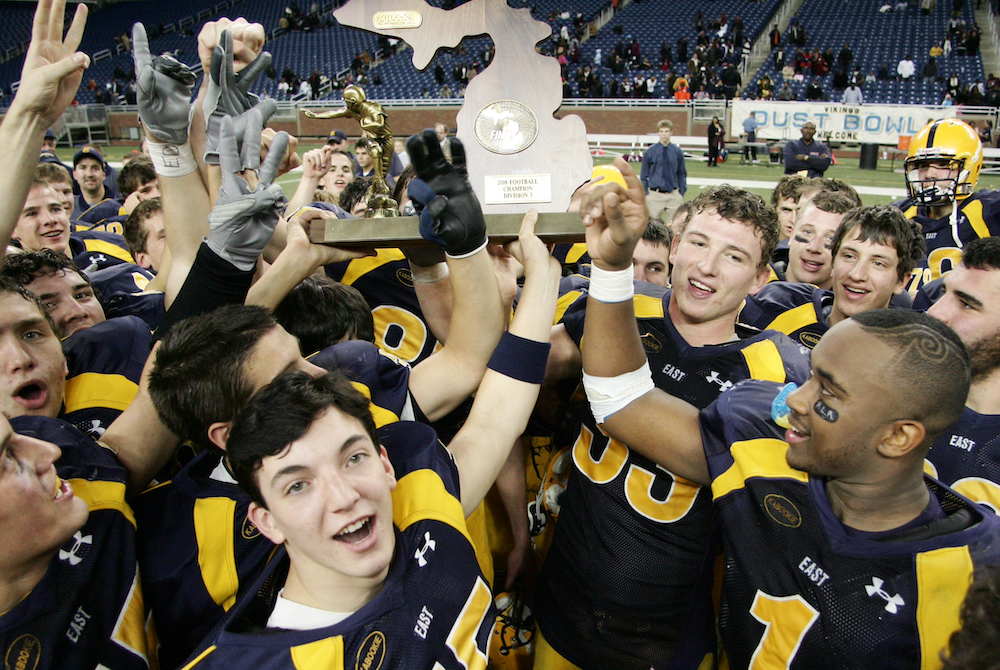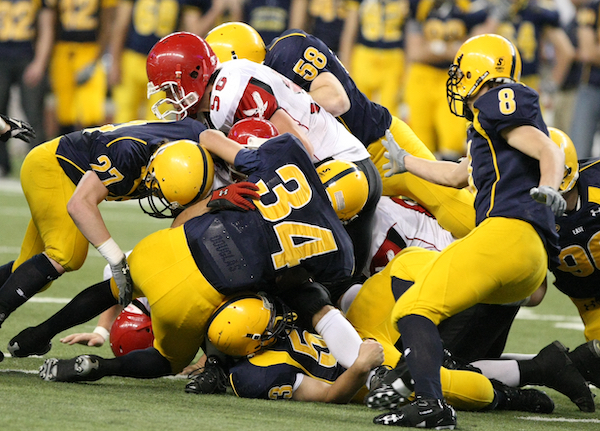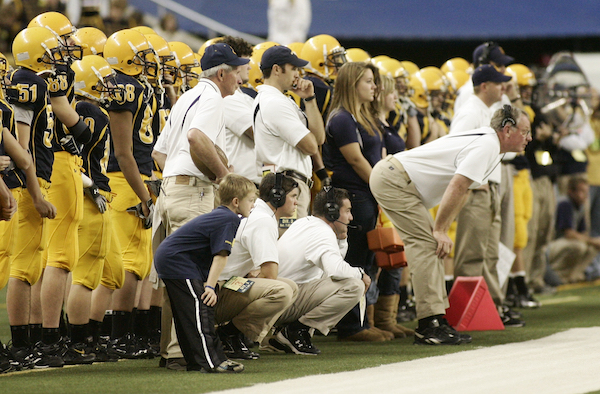
Ithaca Finds a Hero in Hessbrook
November 23, 2012
By Geoff Kimmerly
Second Half editor
DETROIT – Logan Hessbrook started at quarterback for Ithaca’s junior varsity last season as a sophomore, and probably would start for a few hundred teams that don't have the luxury of all-state quarterbacks every season.
But neither takes away from the fact that he’d taken only one or two reps at the position during the last four weeks of practice. With junior superstar Travis Smith behind center, there really wasn't a need.
So when Smith was injured on his team's second play of Friday’s MHSAA Division 6 Final at Ford Field, his coach and top receiver were quick to offer encouragement.
“I said, ‘Listen bud. Travis isn't coming back,’” Ithaca coach (and Logan’s uncle) Terry Hessbrook said. “’We’re going to live and die with you. Just play the way you’re capable of playing.’”
Senior Markes Gadlen – a three-year starting receiver and the third-string quarterback – also took Logan aside. “I can’t see over the line,” Gadlen told him, “so I was just letting him know he’s all we've got.”
And Hessbrook was more than enough.
Ithaca won its third straight MHSAA title – with a third quarterback leading the way – by downing Constantine 37-27. It was the second straight season the teams met in the championship game.
And Hessbrook was the most unlikely of heroes. Sure, he’s a starting defensive back. But in his number 26 jersey, he couldn't have looked more out of place running the offense – until he led it to four straight scores to break the game open midway through the fourth quarter.
“I was obviously nervous at the beginning, but I settled in as the game went on, and my teammates kept picking me up,” Hessbrook said. “They were saying you’re all right, we can help you, we can pick you up. The linemen did a great job blocking, the receivers did a good job blocking on the edge, and they ran good routes. We just did what we could do.”
The win also gave Ithaca its third straight 14-0 season. That streak of 42 straight victories is fourth in MHSAA history and two from tying for second. It’s also second and one win shy of the longest streak among those that took place entirely within the playoff era that began in 1975.
The Yellowjackets have beaten opponents by an average of 37 points over those games. And this season, they scored their most points (675, good for third-most in MHSAA history) and gave up their fewest (110) of the streak. But this game had all the signs of a streak buster.
“This might be the toughest game we've ever been a part of,” Terry Hessbrook said. “We haven’t faced a lot of adversity during this run. And a lot of our games have been over in the second or the third quarter. For these players to continue to fight the way they (were), I can’t put it into words and I can’t express how proud I am of the way they just kept fighting.”
Smith was hurt on a four-yard run on his team’s second play from scrimmage. But after that and despite his sizable absence, this rematch began playing out a lot like the teams' matchup in 2011.
Like last season, Ithaca and Constantine went into halftime tied – this time 20-20. And like last season, Ben Mallo and the Falcons’ run game was doing just about everything they wanted.
That’s hardly rare – the team ran for 6,407 yards on the season. And in this game, Constantine ran for 287 yards during the first half, and Mallo had 147. But after the Yellowjackets reviewed their assignments during halftime, the Falcons added only 130 more yards over the final two quarters.
 And Logan Hessbrook looked like yet another star Ithaca quarterback. After completing just 2 of 5 passes this season heading into the game, he hit 7 of 13 for 104 yards and two touchdowns. He ran for 113 yards and two more scores.
And Logan Hessbrook looked like yet another star Ithaca quarterback. After completing just 2 of 5 passes this season heading into the game, he hit 7 of 13 for 104 yards and two touchdowns. He ran for 113 yards and two more scores.
“ We've struggled all year stopping people defensively. So when we game-planned to stop Ithaca, it wasn't to stop Travis Smith, so to speak,” Constantine coach Shawn Griffith said. “They did step up, I think, and show the ability to run a little bit better than we thought they were capable of doing when we came into the game. And they still hit the big pass when they needed to. You don’t win 42 straight football games because of one good football player. You've got to have a stable of them, and he’s got quite a few.”
While Ithaca’s second-half possessions amounted to 17 points, Constantine’s turned into seven – and included a turnover on downs, a lost fumble and a punt that was blocked by senior Tyler Gibson and eventually led to a field goal.
Constantine did end up with 504 total yards. Mallo ran for 207 and a touchdown – and had 12 tackles at linebacker – and sophomore Justin Hull added 102 yards and a score on the ground. Senior Tommy Reed, who didn't get to play quarterback in last season’s Final because of an injury, ran for a score and had 10 tackles at safety.
The Falcons finished 11-3 and made their run after finishing third in the Kalamazoo Valley Association.
“We were all seniors, and we all wanted to get back. We didn't want football to end, because for most of us this is our last chance,” Reed said. “Once the playoffs came, we finally started playing as a team. Our defense picked up and our offense continued to roll.
“To get back here, we had a couple turnovers that went our way, and we were able to convert on every turnover. This game was the opposite. We had a couple of turnovers and we couldn't convert, and the one we turned over to them they ended up converting. That’s what hurt us.”
Senior Jared Evers ran for one score and caught a pass for another for Ithaca. Senior Josh Capen had a team-high 10 tackles.
Click for full statistics and to watch a replay of the game. See below for the full press conference.
PHOTOS: (Top) Ithaca quarterback Logan Hessbrook (26) eludes Constantine defenders during one of his runs Friday. (Middle) Ithaca receiver Markes Gadlen hauls in a touchdown pass midway through the second quarter. (Click for more from Terry McNamara Photography.)

EGR 5-Year Title Run Remains Awe-Inspiring, Product of More Than Talent Alone
By
Steve Vedder
Special for MHSAA.com
November 25, 2022
It was Peter Stuursma's first year at East Grand Rapids and while the wolves weren't necessarily knocking at the door, they were definitely on the prowl.
The tradition-rich Pioneers football team had slumped to an uncharacteristic 3-6 record in Stuursma's first season as varsity head coach in 2000, and there were subtle signs a community used to winning was growing restless with the program's direction.
That's when Stuursma bumped into one of his players coming out of the weight room, and the two had a quick conversation which he clearly remembers 22 years later.
"It was this senior offensive lineman and all he said was, 'Don't worry about it Coach, it's not going to happen again. We got this,’" Stuursma said. "We had just gone 3-6, and I'm wondering how we're going to get this going and that they might get rid of me. You never underestimate what people can do."
East Grand Rapids, under legendary coach George Barcheski, had been the dominant football program in West Michigan with 28 winning seasons over 29 from 1970-99, and 38 victories in 39 games from 1993-95, along with Class B championships in 1976 and 1983. After Stuursma replaced the retiring Barcheski,, some in the community were expecting more of the same when it came to success.
Those fans never dreamed what they would see as the Pioneers promptly pieced together arguably the greatest decade-long stretch in Michigan high school football history – and without doubt one of the most incredible five-year runs of dominance.
Even that optimistic offensive lineman couldn't have imagined a remarkable 126-7 record over the next 11 years, a 40-3 MHSAA Tournament mark and seven Finals championships. Five of those titles (2006-10) came in a row, a feat accomplished just three times in the now 46-year history of the playoffs.
 The five straight championships were part of an amazing era that Stuursma and his players say has not diminished with time. They recall no single factor explained going 67-3 overall over those five seasons. There was talent, obviously, but coaching, tradition, confidence and strength of community all played vital parts. There were Thanksgiving practices attended by hundreds of former football alumni, dedicated fan support that included playing before more than 30,000 fans at least twice at Ford Field, and a program-wide attitude that, while some may call it a cliché, proved that success did indeed breed success.
The five straight championships were part of an amazing era that Stuursma and his players say has not diminished with time. They recall no single factor explained going 67-3 overall over those five seasons. There was talent, obviously, but coaching, tradition, confidence and strength of community all played vital parts. There were Thanksgiving practices attended by hundreds of former football alumni, dedicated fan support that included playing before more than 30,000 fans at least twice at Ford Field, and a program-wide attitude that, while some may call it a cliché, proved that success did indeed breed success.
"I'm in awe of the scope of things," said Stuursma, whose team used back-to-back Division 3 championships in 2002-03 as a springboard to later success. "Because we had won a couple times before it just started to feel normal. We had such support the community used to think Thanksgiving break ended at Ford Field."
EGR teams would find all kinds of ways to win during the five-year title stretch. The 2009 team, for instance, barreled through its first four playoff opponents by a combined score of 164-29 until a 24-21 win over Orchard Lake St. Mary’s in the Final. The 2010 team had to win three playoff games by eight points or fewer to finish off its perfect 14-0 record. And then there was the wild 46-39 five-overtime win over St. Mary's in the 2007 Final during which the Pioneers had to score on all five possessions in overtime to outlast the Eaglets.
While teams always seemed to find ways to get the victory, former players remember what it was like to be part of a seemingly endless tradition of success on the football field.
"One of the things that was so special about East Grand Rapids were the expectations," said Luke Glendening, a running back on the 2006 team who has gone on to a long NHL career with the Detroit Red Wings and Dallas Stars. "During the game I'd look around and see guys who had played here a long time ago. I viewed it as a privilege to have the opportunity to play before the alumni and community."
Quarterback Ryan Elble, who completed a combined 34 passes for 483 yards and seven touchdowns during the 2008 and 2009 Finals, also used the word "honored" to describe his high school experience.
"The culture was to win. Coach Stuursma made it fun, and it always seemed to take shape on the field," said Elble, who went on to play baseball at Miami (Ohio) "I think each team had different skill sets, but at the end of the day it was our culture and putting in the work to spend Thanksgiving weekend at Ford Field."
The players point to that winning culture over talent. Elble said he played with only one eventual Division I college player in linebacker/running back Trent Voss, who went on to Toledo. Nobody wins without talent, of course, but they point to many other factors as being just as critical. Because EGR coaches would always work juniors into the lineup, Stuursma said the program faced only one major rebuild, in 2007. That team wound up 13-1 and the second of those five straight champions.
 "We had some incredible players," said Stuursma, who left EGR in 2016 to lead Hope College to two Michigan Intercollegiate Athletic Association titles, three second-place finishes and a 46-15 overall record over his seven seasons. "We returned only two starters (in 2007), but we still had good guys who wanted to win."
"We had some incredible players," said Stuursma, who left EGR in 2016 to lead Hope College to two Michigan Intercollegiate Athletic Association titles, three second-place finishes and a 46-15 overall record over his seven seasons. "We returned only two starters (in 2007), but we still had good guys who wanted to win."
The players say the culture started with Barcheski and the program's tradition. As Hope College's coach, Stuursma said there’s a similar common thread among schools he sees on recruiting visits: a winning tradition that, in Stuursma's words "screams excellence," from every corner of the building. He sees it the minute he walks into some schools, and East Grand Rapids had the same culture before he arrived. The past players say it played a major part in their careers.
That tradition didn't start with the five straight titles, said former quarterback Kyle Cunningham, who played on the 2002-03 teams and went 46-0 over four years from his freshman to senior seasons. Those two championship teams’ most recognizable player was running back Kevin Grady, who still holds multiple MHSAA records including for career rush yardage and went on to play at University of Michigan.
"We worked hard and had a lot of pride," he said. "I remember watching film of earlier teams, and I remember hoping our team could stand up the same way."
While the players point to tradition and community, Ryan Blair, a tight end/defensive tackle on the 2006-08 champion clubs, said talent remained critical – but EGR was outmanned physically in some of those title games. That's when camaraderie and the confidence that someone was going to make a key play took over. The Pioneers' remarkable run was teeming with such plays.
"Certainly we were never one of the biggest teams there, we never had a big size advantage in any game," he said. "But we had this camaraderie on every team. We had guys who really liked playing with each other. When things got tight we stuck together, and we'd fight to the fourth quarter or beyond."
Despite the long odds of winning a single state title let alone repeating, Stuursma believes there could be a team one day which wins six straight. That team will have the same characteristics of those EGR teams – the talent, coaching, tradition and fortune of catching timely breaks – but it can be done, he said.
"Absolutely," Stuursma said. "The only record I can think of that won't be broken is Wayne Gretzky's (NHL) scoring record. It will take a lot, but records are made to be broken. I think high school football is on the upswing and there would have to be an emphasis on winning. You would have to have a good path to get there, but I can see someone getting six one day."
PHOTOS (Top) East Grand Rapids celebrates its third-straight Division 3 championship win in 2008. (Middle) Pioneers converge on an Orchard Lake St. Mary’s ball carrier during the 2007 five-overtime title decider. (Below) EGR coach Peter Stuursma, kneeling center, monitors the action during the 2010 championship game.

